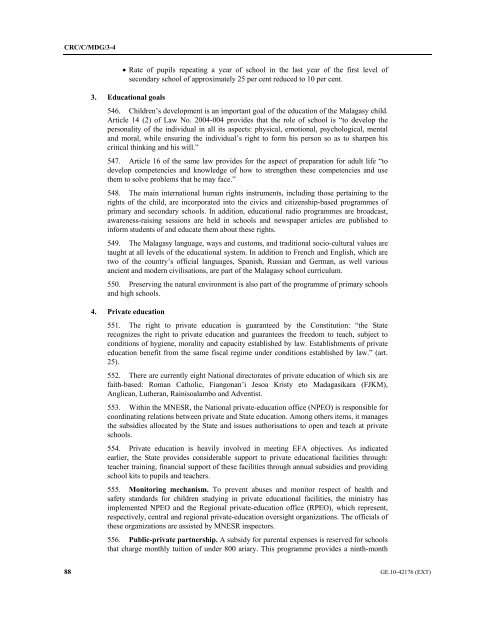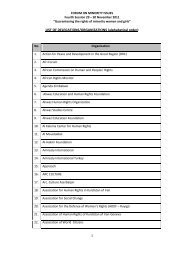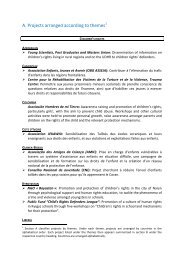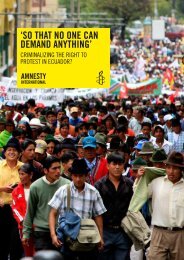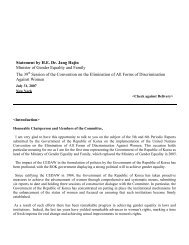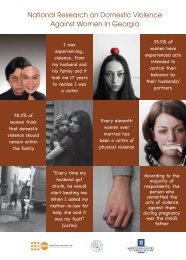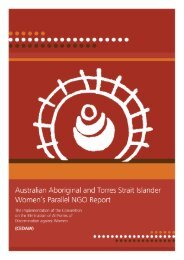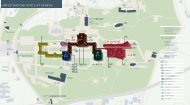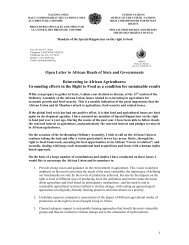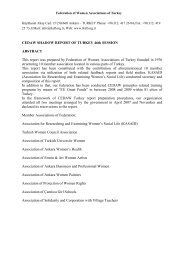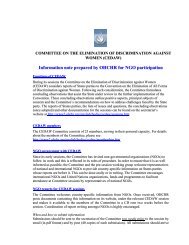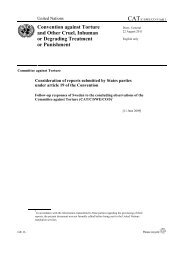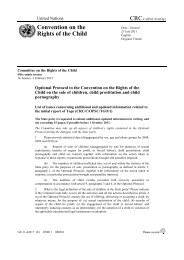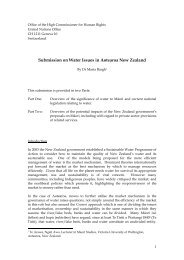CRC/C/MDG/3-4 - Office of the High Commissioner for Human Rights
CRC/C/MDG/3-4 - Office of the High Commissioner for Human Rights
CRC/C/MDG/3-4 - Office of the High Commissioner for Human Rights
You also want an ePaper? Increase the reach of your titles
YUMPU automatically turns print PDFs into web optimized ePapers that Google loves.
<strong>CRC</strong>/C/<strong>MDG</strong>/3-4<br />
• Rate <strong>of</strong> pupils repeating a year <strong>of</strong> school in <strong>the</strong> last year <strong>of</strong> <strong>the</strong> first level <strong>of</strong><br />
secondary school <strong>of</strong> approximately 25 per cent reduced to 10 per cent.<br />
3. Educational goals<br />
546. Children’s development is an important goal <strong>of</strong> <strong>the</strong> education <strong>of</strong> <strong>the</strong> Malagasy child.<br />
Article 14 (2) <strong>of</strong> Law No. 2004-004 provides that <strong>the</strong> role <strong>of</strong> school is “to develop <strong>the</strong><br />
personality <strong>of</strong> <strong>the</strong> individual in all its aspects: physical, emotional, psychological, mental<br />
and moral, while ensuring <strong>the</strong> individual’s right to <strong>for</strong>m his person so as to sharpen his<br />
critical thinking and his will.”<br />
547. Article 16 <strong>of</strong> <strong>the</strong> same law provides <strong>for</strong> <strong>the</strong> aspect <strong>of</strong> preparation <strong>for</strong> adult life “to<br />
develop competencies and knowledge <strong>of</strong> how to streng<strong>the</strong>n <strong>the</strong>se competencies and use<br />
<strong>the</strong>m to solve problems that he may face.”<br />
548. The main international human rights instruments, including those pertaining to <strong>the</strong><br />
rights <strong>of</strong> <strong>the</strong> child, are incorporated into <strong>the</strong> civics and citizenship-based programmes <strong>of</strong><br />
primary and secondary schools. In addition, educational radio programmes are broadcast,<br />
awareness-raising sessions are held in schools and newspaper articles are published to<br />
in<strong>for</strong>m students <strong>of</strong> and educate <strong>the</strong>m about <strong>the</strong>se rights.<br />
549. The Malagasy language, ways and customs, and traditional socio-cultural values are<br />
taught at all levels <strong>of</strong> <strong>the</strong> educational system. In addition to French and English, which are<br />
two <strong>of</strong> <strong>the</strong> country’s <strong>of</strong>ficial languages, Spanish, Russian and German, as well various<br />
ancient and modern civilisations, are part <strong>of</strong> <strong>the</strong> Malagasy school curriculum.<br />
550. Preserving <strong>the</strong> natural environment is also part <strong>of</strong> <strong>the</strong> programme <strong>of</strong> primary schools<br />
and high schools.<br />
4. Private education<br />
551. The right to private education is guaranteed by <strong>the</strong> Constitution: “<strong>the</strong> State<br />
recognizes <strong>the</strong> right to private education and guarantees <strong>the</strong> freedom to teach, subject to<br />
conditions <strong>of</strong> hygiene, morality and capacity established by law. Establishments <strong>of</strong> private<br />
education benefit from <strong>the</strong> same fiscal regime under conditions established by law.” (art.<br />
25).<br />
552. There are currently eight National directorates <strong>of</strong> private education <strong>of</strong> which six are<br />
faith-based: Roman Catholic, Fiangonan’i Jesoa Kristy eto Madagasikara (FJKM),<br />
Anglican, Lu<strong>the</strong>ran, Rainisoalambo and Adventist.<br />
553. Within <strong>the</strong> MNESR, <strong>the</strong> National private-education <strong>of</strong>fice (NPEO) is responsible <strong>for</strong><br />
coordinating relations between private and State education. Among o<strong>the</strong>rs items, it manages<br />
<strong>the</strong> subsidies allocated by <strong>the</strong> State and issues authorisations to open and teach at private<br />
schools.<br />
554. Private education is heavily involved in meeting EFA objectives. As indicated<br />
earlier, <strong>the</strong> State provides considerable support to private educational facilities through:<br />
teacher training, financial support <strong>of</strong> <strong>the</strong>se facilities through annual subsidies and providing<br />
school kits to pupils and teachers.<br />
555. Monitoring mechanism. To prevent abuses and monitor respect <strong>of</strong> health and<br />
safety standards <strong>for</strong> children studying in private educational facilities, <strong>the</strong> ministry has<br />
implemented NPEO and <strong>the</strong> Regional private-education <strong>of</strong>fice (RPEO), which represent,<br />
respectively, central and regional private-education oversight organizations. The <strong>of</strong>ficials <strong>of</strong><br />
<strong>the</strong>se organizations are assisted by MNESR inspectors.<br />
556. Public-private partnership. A subsidy <strong>for</strong> parental expenses is reserved <strong>for</strong> schools<br />
that charge monthly tuition <strong>of</strong> under 800 ariary. This programme provides a ninth-month<br />
88 GE.10-42176 (EXT)


